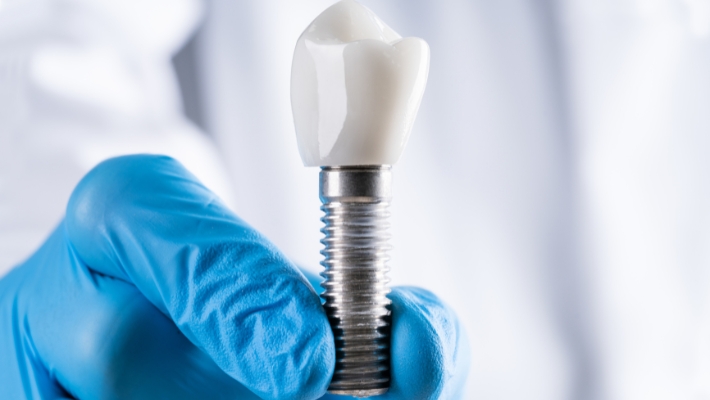Tooth loss is a problem that affects many people, whether due to cavities, periodontal disease, trauma or aging. It can have negative consequences on oral health, masticatory function, smile aesthetics and self-confidence. Fortunately, there is a modern and effective solution for replacing missing teeth: dental implants.
What is a dental implant?
A dental implant is an artificial root made of titanium or zirconia, which is inserted into the jawbone. On this root, a ceramic crown can be attached, which will imitate the appearance and function of a natural tooth. The implant thus makes it possible to replace one or more missing teeth, without having to resort to removable prostheses or bridges which require cutting the adjacent teeth.
The benefits of dental implants
Dental implants have many advantages over other tooth replacement solutions:
- They are stable and comfortable because they integrate with the bone through a phenomenon called osseointegration.
- They are durable and resistant, because they are made with biocompatible and strong materials.
- They are aesthetic and natural, because they reproduce the shape, color and brightness of real teeth.
- They preserve the alveolar bone, which tends to resorb in cases of edentulism.
- They improve chewing, speaking and smiling, which contributes to quality of life and well-being.
How is the installation of a dental implant carried out?
The installation of a dental implant is generally done in several stages:
- The initial consultation: the dental surgeon carries out a complete assessment of the patient's oral health, as well as a 3D radiological examination (scanner or cone beam) to assess the quantity and quality of the available bone. He then establishes a personalized treatment plan and a detailed estimate.
- Implant surgery: under local anesthesia, the dental surgeon incises the gum and drills a hole in the bone to insert the implant. He then closes the gum with stitches. Depending on the case, he can place a healing screw or a temporary abutment on the implant.
- The healing phase: you have to wait between 2 and 6 months for the implant to integrate into the bone. During this period, the patient must practice good oral hygiene and avoid foods that are too hard or sticky. He can wear a temporary prosthesis to hide his toothlessness.
- Placement of the crown: once the implant is well integrated, the dentist takes an impression of the patient's mouth to make the final crown. He then fixes the crown to the implant using a screw or cement.
How much does a dental implant cost?
The price of a dental implant varies depending on several factors, such as the type and number of implants, the material and brand used, the use or not of bone or gum grafts, the type and number of crowns, etc. . On average, it costs between 7,000 and 12,000 dirhams per complete implant.
Dental implants offer an effective and long-lasting solution to solving tooth loss problems once and for all. With their many benefits, including their stability, aesthetics, functionality and ability to preserve bone, dental implants have become the standard for replacing missing teeth. If you are suffering from tooth loss and are looking for a permanent and aesthetic solution, dental implants may be the answer you have been waiting for.
 Français
Français
